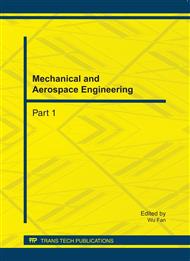[1]
Paisarn Sompakit, CNC World Industrial Electrics", What is CAD/CAM, Mold Journal, February, 2002, p.35.
Google Scholar
[2]
Amrine, H.T. Ritchey,J. A. and Moodie C.L., Manufacturing Organization and Management, New Jersey, Prentice-hall, 1997, pp.71-78.
Google Scholar
[3]
Praisarn, Somprakit. CNC World Industrial Electrics,. Mold Magazine, January, 2003, pp.34-36.
Google Scholar
[4]
Damri Sukhotanang, Dr., The promising step 2005 annual report,. Project to Develop Molding Industry, 10 January, 2006, pp.5-6.
Google Scholar
[5]
Tangsakul, Sunimon. Thailand Molding Industry Association 2001-2004,. Molding Industry Directory, 2003, pp.48-50.
Google Scholar
[6]
Molding Industry Development Project. The promising step 2005 annual report,. Molding Industry Development Project, 10 January, 2003, pp.8-10.
Google Scholar
[7]
Sarayut Thong-U-thai and Sittichai Kaewkuekool, The study of situation, problem, obstacle and needs of labor's competencies for molding industry,. APIEMS & CIIE 2007. International Conference, 11 December, Kaohsiung University, TAIWAN. 2007, pp. xx.
Google Scholar
[8]
Sarayut Thong-U-thai and Sittichai Kaewkuekool, The study needs of labor's competencies for molding industry, ICASE Asian Symposium 2007 0n Science Education, . International Conference, Jomtien Beach Hotel, Pattaya, Thailand, 7 November. Mahidol University. 2007, pp. xx.
Google Scholar
[9]
Scottich Qualification Authority. "National Certificate Module,. [online] [cited 2007 March]. Available from : http: /www. sqa. org. uk. e, (2007).
Google Scholar
[10]
Chana, Kasipar., Lecture on Innovation in Learning for Vocational Education,. Making Vocational Competence Standards, Chapter 4. 2005. pp.47-69.
Google Scholar
[11]
British Council. Education Enterprise Linkages,. London : Developing Occupational Standards and Qualification. (2003).
Google Scholar
[12]
National Qualification Framework. Manufacturing Textile,. [online] [cited 2006 April]. Available from : http: /www. nvq_org. uk, (2007).
Google Scholar
[13]
Geofferey N. Master ; Doug McCurry, Competency-Based Assessment in the Professions,. National Office of Overseas Skill Recogmition. (1990).
Google Scholar
[14]
Cuddy Natalia and Leney Tom. Vocational Education and Training in the United Kingdom, Short Description. United Kingdom : Luxembourg Office for Official Publications of the European Communities. (2005).
Google Scholar
[15]
Boontam, Kitpreedaborisut. Research Methodology for Social Sciences,. Bangkok. 6th Impression, B&B Publishing. (1998).
Google Scholar
[16]
Jensen, C. Delphi in Depth: Power Techniques from the Experts Berkeley,. Singapore: McGraw-Hill, (1996).
Google Scholar
[17]
Kamnung, Tongket et al. Supplementary Document for the Course on the Development of Education and Enterprise in terms of Principles and Techniques for Industrial Training,. Bangkok, Faculty of Industrial Education, KMITNB. 2001. pp.86-93.
Google Scholar
[18]
Chana, Kasipar., Lecture on Innovation in Learning for Vocational Education,. Making Vocational Competence Standards, Chapter 2-3. 2005. pp.32-46.
Google Scholar


